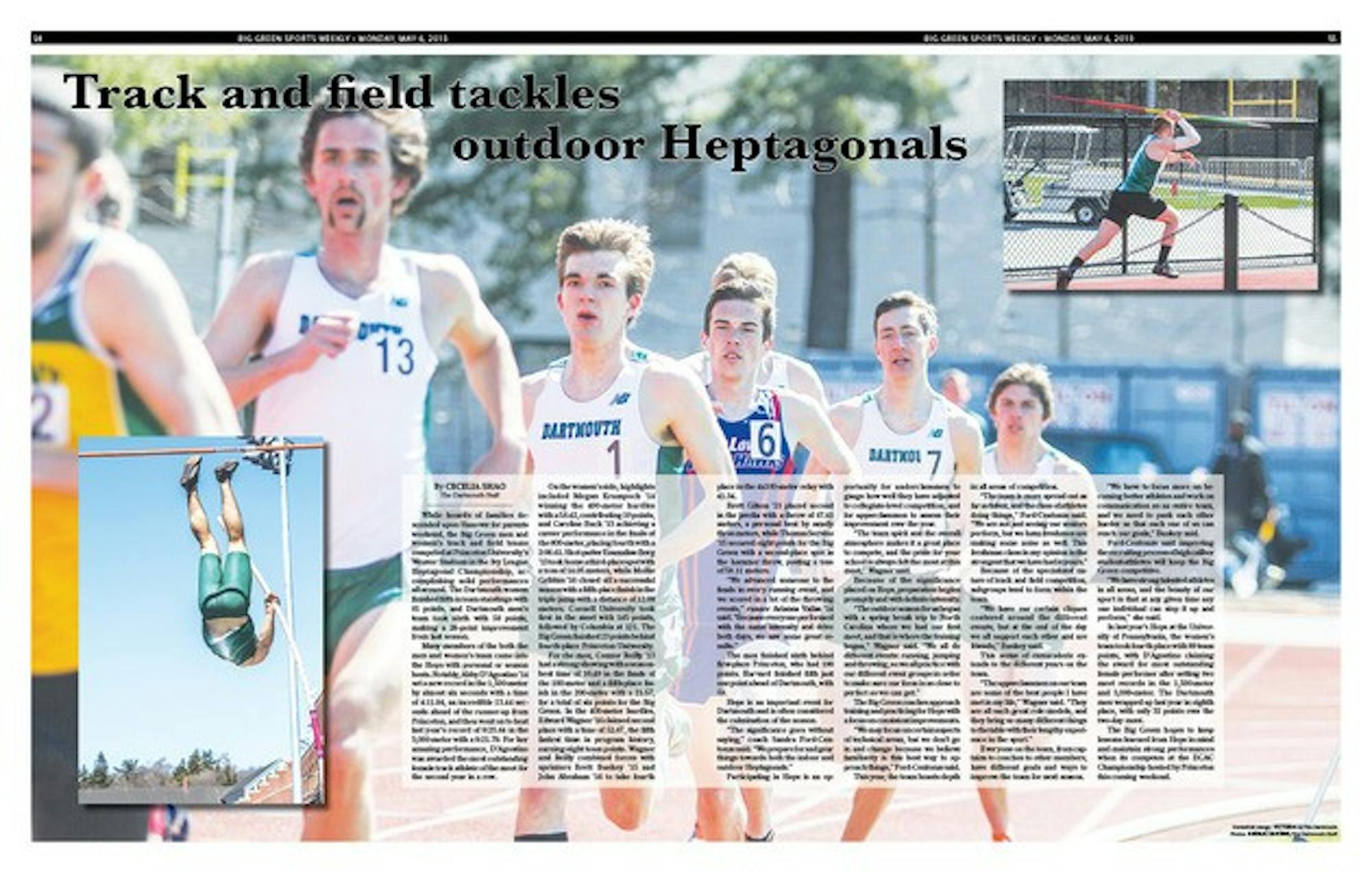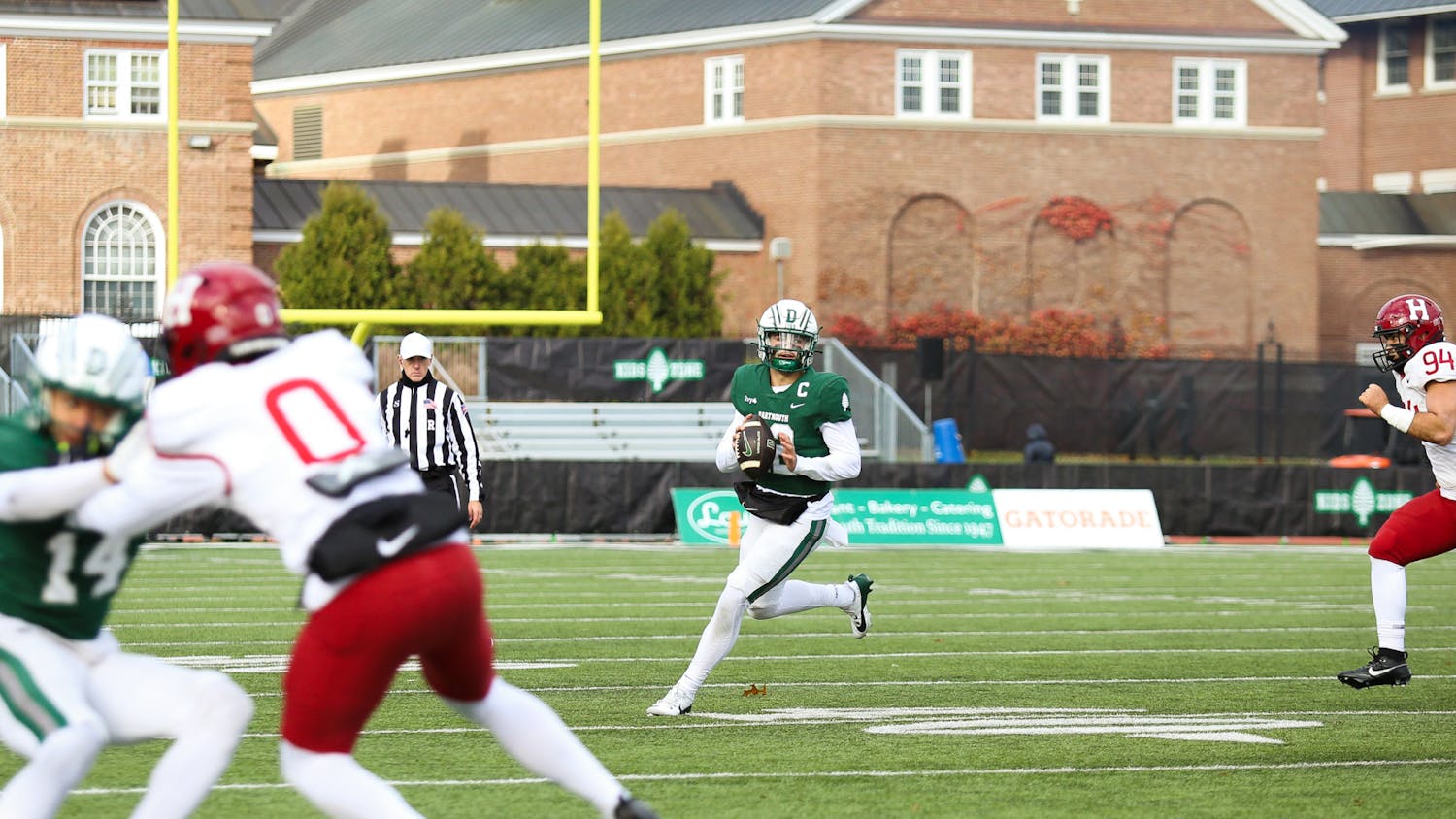Many members of the both the men and women's team came into the Heps with personal or season bests. Notably, Abby D'Agostino '14 set a new record in the 1,500-meter by almost six seconds with a time of 4:11.94, an incredible 13.44 seconds ahead of the runner-up from Princeton, and then went on to beat last year's record of 9:23.64 in the 3,000-meter with a 9:21.79. For her amazing performance, D'Agostino was awarded the most outstanding female track athlete of the meet for the second year in a row.
On the women's side, highlights included Megan Krumpoch '14 winning the 400-meter hurdles with a 58.42, contributing 10 points, and Caroline Buck '13 achieving a career performance in the finals of the 800-meter, placing fourth with a 2:08.61. Shot-putter Emmaline Berg '13 took home a third-place spot with a toss of 14.05 meters, while Mollie Gribbin '16 closed off a successful season with a fifth-place finish in the triple jump with a distance of 12.08 meters. Cornell University took first in the meet with 145 points, followed by Columbia at 121. The Big Green finished 23 points behind fourth-place Princeton University.
For the men, Connor Reilly '13 had a strong showing with a season-best time of 10.49 in the finals of the 100-meter and a fifth-place finish in the 200-meter with a 21.57, for a total of six points for the Big Green. In the 400-meter hurdles, Edward Wagner '16 claimed second place with a time of 52.67, the fifth fastest time in program history, earning eight team points. Wagner and Reilly combined forces with sprinters Brett Buskey '15 and John Abraham '16 to take fourth place in the 4x100-meter relay with 41.34.
Brett Gilson '13 placed second in the javelin with a throw of 67.65 meters, a personal best by nearly three meters, while Thomas Servino '15 secured eight points for the Big Green with a second-place spot in the hammer throw, posting a toss of 58.11 meters.
"We advanced someone to the finals in every running event, and we scored in a lot of the throwing events," runner Arianna Vailas '14 said. "Because everyone performed with the same intensity and drive both days, we saw some great results."
The men finished sixth behind first-place Princeton, who had 190 points. Harvard finished fifth just one point ahead of Dartmouth, with 59.
Heps is an important event for Dartmouth and is often considered the culmination of the season.
"The significance goes without saying," coach Sandra Ford-Centonze said. "We prepare for and gear things towards both the indoor and outdoor Heptagonals."
Participating in Heps is an opportunity for underclassmen to gauge how well they have adjusted to collegiate-level competition, and for upperclassmen to assess their improvement over the year.
"The team spirit and the overall atmosphere makes it a great place to compete, and the pride for your school is always felt the most at this meet," Wagner said.
Because of the significance placed on Heps, preparation begins promptly and with definite intensity.
"The outdoor season for us began with a spring break trip to North Carolina where we had our first meet, and that is where the training began," Wagner said. "We all do different events: running, jumping and throwing, so we all practice with our different event groups in order to make sure our form is as close to perfect as we can get."
The Big Green coaches approach training and practicing for Heps with a focus on consistent improvements.
"We may focus on certain aspects of technical areas, but we don't go in and change because we believe familiarity is this best way to approach things," Ford-Centonze said.
This year, the team boasts depth in all areas of competition.
"The team is more spread out as far as talent, and the class of athletes doing things," Ford-Centonze said. "We are not just seeing our seniors perform, but we have freshmen are making some noise as well. This freshman class in my opinion is the strongest that we have had in years."
Because of the specialized nature of track and field competition, subgroups tend to form within the team.
"We have our certain cliques centered around the different events, but at the end of the day we all support each other and are friends," Buskey said.
This sense of camaraderie extends to the different years on the team.
"The upperclassmen on our team are some of the best people I have met in my life," Wagner said. "They are all such great role models, and they bring so many different things to the table with their lengthy experience in the sport."
Everyone on the team, from captains to coaches to other members, have different goals and ways to improve the team for next season.
"We have to focus more on becoming better athletes and work on communication as an entire team, and we need to push each other harder so that each one of us can reach our goals," Buskey said.
Ford-Centonze said improving the recruiting process of high caliber student-athletes will keep the Big Green competitive.
"We have strong talented athletes in all areas, and the beauty of our sport is that at any given time any one individual can step it up and perform," she said.
In last year's Heps at the University of Pennsylvania, the women's team took fourth place with 89 team points, with D'Agostino claiming the award for most outstanding female performer after setting two meet records in the 1,500-meter and 3,000-meter. The Dartmouth men wrapped up last year in eighth place, with only 32 points over the two-day meet.
The Big Green hopes to keep lessons learned from Heps in mind and maintain strong performances when its competes at the ECAC Championship hosted by Princeton this coming weekend.




